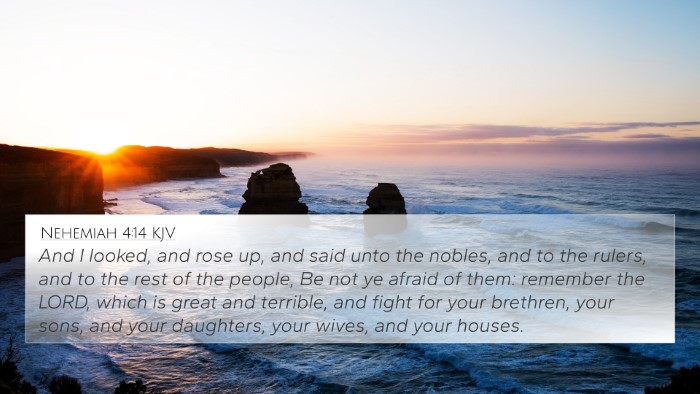Understanding 1 Chronicles 19:13
Verse (1 Chronicles 19:13): "Be of good courage, and let us behave ourselves valiantly for our people, and for the cities of our God: and let the Lord do that which is good in his sight."
Summary of Biblical Context
This verse is set against the backdrop of King David's military campaigns and the community's call to defend their people and cities. The exhortation to act courageously reflects the challenges faced during the confrontation with the Ammonites and the Syrians.
Insights from Public Domain Commentaries
-
Matthew Henry
Matthew Henry emphasizes the call to courage and valor. He explains that this courageous action is not just for personal glory but for the benefit of the community and the Lord. Henry points out that David's leaders encouraged the troops to trust in God, underscoring a reliance on divine support in their endeavors.
-
Albert Barnes
Albert Barnes highlights the significance of unity and bravery. He notes that this exhortation reflects a broader theme of collective responsibility among God's people. Barnes interprets the phrase "behave ourselves valiantly" as a reminder that believers are to work together for the common good, supported by the assurance of God's favor in their actions.
-
Adam Clarke
Adam Clarke provides a detailed analysis of the historical context surrounding this verse. He argues that the encouragement for valor is crucial during times of war and strife. Clarke also connects this call for courage to the ultimate sovereignty of God over events, suggesting that the outcome is in God's hands, which encourages the faithful to act without fear.
Thematic Connections
This verse resonates with themes of courage, community, and reliance on God, which can be cross-referenced with several other scriptural passages:
- Joshua 1:9: "Have I not commanded you? Be strong and courageous. Do not be frightened, and do not be dismayed, for the Lord your God is with you wherever you go." - A direct parallel encouraging strength amidst challenges.
- Psalm 31:24: "Be strong, and let your heart take courage, all you who wait for the Lord!" - Invokes a theme of hope and patience in reliance on God.
- Isaiah 41:10: "Fear not, for I am with you; be not dismayed, for I am your God; I will strengthen you, I will help you." - God’s promise to provide strength in times of fear.
- 1 Corinthians 16:13: "Be watchful, stand firm in the faith, act like men, be strong." - A New Testament exhortation paralleling the need for courage and strength.
- Ephesians 6:10: "Finally, be strong in the Lord and in the strength of his might." - Reminds believers that their strength comes from God.
- Philippians 4:13: "I can do all things through him who strengthens me." - Highlights the empowerment believers receive from Christ.
- Romans 8:31: "What then shall we say to these things? If God is for us, who can be against us?" - Reinforces the protective and guiding nature of God in all conflicts.
Cross-Referencing Biblical Texts
To fully understand the implications of 1 Chronicles 19:13, one can utilize various Bible cross-reference tools. These include:
- Bible concordances
- Bible cross-reference guides to facilitate deeper study
- Resources that highlight thematically related Bible verses
- Cross-reference Bible study methods that enhance understanding
Conclusion
The message encapsulated within 1 Chronicles 19:13 serves as a timeless reminder of the strength that comes through faith and community, urging believers to act valiantly and courageously in the face of adversities. By cross-referencing this verse with associated scriptural passages, one can develop a deeper understanding of the interconnectedness of biblical themes related to courage, divine guidance, and communal responsibility.
Further Study and Reflection
For those interested in enhancing their biblical study, consider examining how to identify connections between the Old and New Testaments, utilizing Bible reference resources that facilitate comprehensive study, and exploring links between the teachings of the Prophets and New Testament Apostolic doctrine.


















